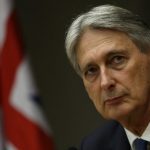Nigeria should remove currency-trading restrictions and reduce its budget deficit and debt-service costs to “sustainable” levels, the International Monetary Fund said.

“Stronger macroeconomic policies are urgently needed to rebuild confidence and foster an economic recovery,” the Washington-based lender said in a report Thursday after a team visited Nigeria. There’s a “need for a front-loaded, revenue-based fiscal consolidation starting in 2017, to reduce the federal government interest-payments-to-revenue ratio to sustainable levels.”
Nigeria should remove currency-trading restrictions and reduce its budget deficit and debt-service costs to “sustainable” levels, the International Monetary Fund said.

“Stronger macroeconomic policies are urgently needed to rebuild confidence and foster an economic recovery,” the Washington-based lender said in a report Thursday after a team visited Nigeria. There’s a “need for a front-loaded, revenue-based fiscal consolidation starting in 2017, to reduce the federal government interest-payments-to-revenue ratio to sustainable levels.”
Nigeria should remove currency-trading restrictions and reduce its budget deficit and debt-service costs to “sustainable” levels, the International Monetary Fund said.

“Stronger macroeconomic policies are urgently needed to rebuild confidence and foster an economic recovery,” the Washington-based lender said in a report Thursday after a team visited Nigeria. There’s a “need for a front-loaded, revenue-based fiscal consolidation starting in 2017, to reduce the federal government interest-payments-to-revenue ratio to sustainable levels.”
Nigeria should remove currency-trading restrictions and reduce its budget deficit and debt-service costs to “sustainable” levels, the International Monetary Fund said.

“Stronger macroeconomic policies are urgently needed to rebuild confidence and foster an economic recovery,” the Washington-based lender said in a report Thursday after a team visited Nigeria. There’s a “need for a front-loaded, revenue-based fiscal consolidation starting in 2017, to reduce the federal government interest-payments-to-revenue ratio to sustainable levels.”
Nigeria should remove currency-trading restrictions and reduce its budget deficit and debt-service costs to “sustainable” levels, the International Monetary Fund said.

“Stronger macroeconomic policies are urgently needed to rebuild confidence and foster an economic recovery,” the Washington-based lender said in a report Thursday after a team visited Nigeria. There’s a “need for a front-loaded, revenue-based fiscal consolidation starting in 2017, to reduce the federal government interest-payments-to-revenue ratio to sustainable levels.”
Nigeria should remove currency-trading restrictions and reduce its budget deficit and debt-service costs to “sustainable” levels, the International Monetary Fund said.

“Stronger macroeconomic policies are urgently needed to rebuild confidence and foster an economic recovery,” the Washington-based lender said in a report Thursday after a team visited Nigeria. There’s a “need for a front-loaded, revenue-based fiscal consolidation starting in 2017, to reduce the federal government interest-payments-to-revenue ratio to sustainable levels.”
Nigeria should remove currency-trading restrictions and reduce its budget deficit and debt-service costs to “sustainable” levels, the International Monetary Fund said.

“Stronger macroeconomic policies are urgently needed to rebuild confidence and foster an economic recovery,” the Washington-based lender said in a report Thursday after a team visited Nigeria. There’s a “need for a front-loaded, revenue-based fiscal consolidation starting in 2017, to reduce the federal government interest-payments-to-revenue ratio to sustainable levels.”
Nigeria should remove currency-trading restrictions and reduce its budget deficit and debt-service costs to “sustainable” levels, the International Monetary Fund said.

“Stronger macroeconomic policies are urgently needed to rebuild confidence and foster an economic recovery,” the Washington-based lender said in a report Thursday after a team visited Nigeria. There’s a “need for a front-loaded, revenue-based fiscal consolidation starting in 2017, to reduce the federal government interest-payments-to-revenue ratio to sustainable levels.”













